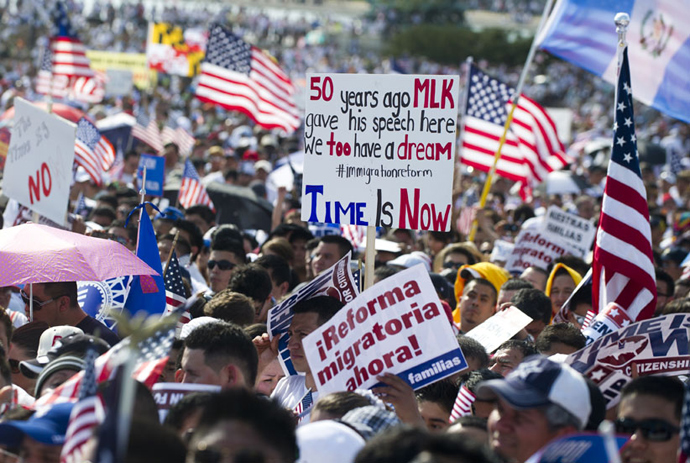The fate of the United States immigration reform could be a turning point on whether the House of Representatives, which is controlled by the Republican, will embrace a road to citizenship for 11 million immigrants who are undocumented. There has been continuous opposition to an all-inclusive bill and there is a possibility of there being political fallout even if the effort for reforms fails. Those backing the reforms for immigration have been holding rallies in large scale in an attempt to pressure the lawmakers. The opponents have also held events, but fewer and smaller ones, like the one in Richmond, Virginia, which was attended by an arch-enemy for the road to citizenship for the undocumented.

Steven King, a Republican congressman, said that if the country rewarded people because of breaking law, it would lead to the country having more law-breakers. He further added that the immigrants got arrived in the country on their own and if there were no opportunities – if the country cut the job magnets and secured the boarders – many people would return to their home countries. This event was hosted near the district of Eric Cantor, the House Majority Leader. Cantor and the House Speaker, John Boehner, will make a decision as to whether the chamber will eventually vote on a package for reform.
John Feehery, the strategist for Republican, said that if the reform for immigration failed to pass, the blame would be laid on the Republicans. He added that the party risked facing the wrath of the Hispanics, the fastest-growing segment of America. He said that if the voting bloc was alienated, it would lead to a coalition that will continuously vote against them and they might find themselves in huge trouble. In the 2012 presidential elections, Mitt Romney, the Republican presidential candidate, obtained less than 30% of the Hispanic vote.
Angelica Salas, an activist, said that the party’s attitude on the immigration reforms is a major reason why they are reminded not to vote for them or support them. The voting trend has been confirmed by Mark Lopez, a Hispanic researcher at Pew Research Centre, who said that they had noted a surge in the Hispanic people who leaned or identified with the Democrats over the past few years. However, Lopez said that the immigration reform was just one of the issues that interested the Hispanics and there were others such as education and economic opportunity.
Lopez also said that the electorate for the Hispanic currently stands at 23 million and this figure might hit 40 million by 2030. He added that in the last 10 years, Hispanics accounted for over half of the population growth of the country and continuing on, they will account for a larger share and perhaps even the majority of the country’s population growth. The Republican Strategists sees little chance of the immigration reform being passed but he hopes that the party will, at the end, embrace the road to citizenship for those not documented. The House Speaker said that he was aware that the reforms were needed but he has ruled out a vote on a bill which is not supported by the majority of his group, which appears to rule out on the reforms at least for now.
